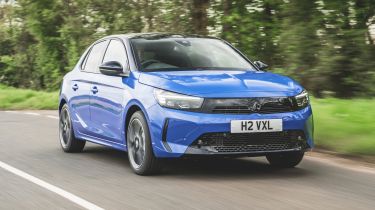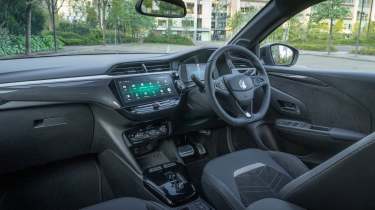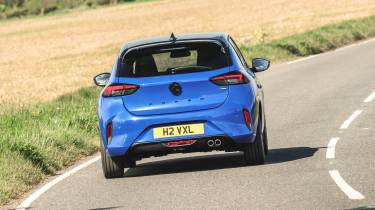New Vauxhall Corsa Hybrid 2024 review: an efficient but imperfect supermini
The Corsa finally has the option of hybrid power, but it’s still bland compared with rivals

Verdict
The Corsa Hybrid could be the goldilocks version of Vauxhall’s ever-faithful supermini. Compared to a standard petrol-powered automatic model, the slick hybrid powertrain offers better fuel economy and an essence of the EV driving experience, but with only a small price bump. However this is by no means the best hybrid supermini around, and the Corsa generally feels bland – certainly not worth the nearly £30k price tag of the top-spec model we drove; cheaper variants represent much better value for money.
The Vauxhall Corsa has been offered with the simple choice of pure-petrol or pure-electric power for some time now, which seemed to suit plenty of buyers quite nicely. The recently facelifted supermini was the third best-selling car in the UK last year, as more than 40,000 examples left showrooms across the country.
But there’s now a third engine option: the Corsa Hybrid. It’s a case of better late than never, as plenty of other superminis have already adopted this technology. The sharp-looking Renault Clio E-Tech springs immediately to mind, along with the Toyota Yaris and new MG3. The last of those has already received a five-star rating from us.
The Corsa’s hybrid powertrain is available in a selection of Stellantis (Vauxhall’s parent company) models now, from the compact Jeep Avenger to the Peugeot 5008 seven-seat SUV. The setup consists of a turbocharged 1.2-litre three-cylinder petrol engine that was developed specially for hybrid applications, paired with a six-speed dual-clutch automatic transmission that has an integrated electric motor.
Used - available now

2019 Vauxhall
Corsa
36,830 milesManualPetrol1.4L
Cash £8,587
2022 Vauxhall
Corsa
17,460 milesAutomaticPetrol1.2L
Cash £14,300
2019 Vauxhall
Corsa
20,283 milesManualPetrol1.4L
Cash £8,663
2019 Vauxhall
Corsa
32,841 milesManualPetrol1.4L
Cash £7,987In the Corsa Hybrid, the engine is available in two states of tune: 99bhp and 205Nm in entry-level cars, or 134bhp and 230Nm of torque for higher-spec models.
Both set-ups get the same e-motor that delivers an extra 28bhp and 55Nm of torque to help when accelerating, and can drive the front wheels in limited situations like when manoeuvring in a car park or creeping along in city traffic.
Despite using a minute 0.9kWh battery, we were surprised by how long the Corsa Hybrid could drive without waking the engine, particularly at low speeds. The electric motor responds immediately to get you underway, and we like that the regenerative braking system that helps recharge the battery when the driver lifts off the accelerator is fairly strong.
That said, it’s not strong enough to deliver full one-pedal driving, nor is there a slightly weaker setting that would allow the car to coast, which would be helpful on motorway journeys.
A belt starter is used to fire up the engine when it’s needed, and the handover back and forth between power sources is practically seamless. The gear changes feel similarly slick, though the powertrain isn’t perfect. The engine sounds strained when it needs to be worked hard, and the initial brake pedal travel feels very unusual as there’s little resistance.
The rest of the driving experience is the same as any other Corsa. It’s no fun to drive per se, but there’s a decent amount of weight to the steering that makes you feel like you’re muscling the car around corners, and it remains composed through the bends thanks to a firm but not uncomfortable ride. Refinement at higher speeds is also solid.
Interior space is unaffected by the hybrid system, as its battery is located underneath the front passenger seat. That said, there wasn’t that much room inside to begin with, so taller adults will struggle to squeeze into the back of the Corsa, and would be more comfortable in the Clio or MG3 hybrids. The 309-litre boot is slightly larger than its rivals, but only fractionally.
The Corsa’s interior generally feels bland too, as so much of it is made from dull black plastic. Although the technology onboard was improved as part of its recent facelift, including a new snappier infotainment system. However the 10-inch touchscreen is angled more towards the roof than the driver, and the view of the screen is blocked slightly by their hands on the steering wheel, and the wheel itself.
Prices for the Corsa Hybrid start from £22,900, which is only about £600 more than a like-for-like petrol-automatic model. That becomes less impressive when you consider the Clio E-Tech is priced from £21,495, and the MG3 embarrasses both cars when it comes to price, starting from £18,495.
If you can’t see yourself in anything but a Corsa Hybrid, we’d recommend sticking with the base Design trim, or the mid-range GS at most. Standard kit includes that 10-inch touchscreen, wireless Apple CarPlay and Android Auto, LED headlights and daytime running lights, rear parking sensors and a smattering of driver assistance systems such as driver drowsiness alert and lane-keeping assist.
Top-of-the-range Ultimate models like we drove tap in at over £29k, and simply don't feel worth the price tag – even before you remember a MG3 costs over £10k less. The adaptive LED Matrix headlights, heated steering wheel and heated front seats, Alcantara seat trim and keyless entry can’t justify the price either.
| Model: | Vauxhall Corsa Hybrid Ultimate |
| Price from: | £22,900 |
| Price as tested: | £29,030 |
| Engine: | 1.2-litre 3cyl turbo petrol MHEV |
| Power/torque: | 134bhp/230Nm |
| Transmission: | Six-speed auto, front-wheel drive |
| 0-62mph: | 8.6 seconds |
| Top speed: | 133mph |
| Economy: | 60.1mpg |
| CO2: | 106/gm |
| On sale: | Now |
| L/W/H: | 4,060/1,960/1,433mm |









